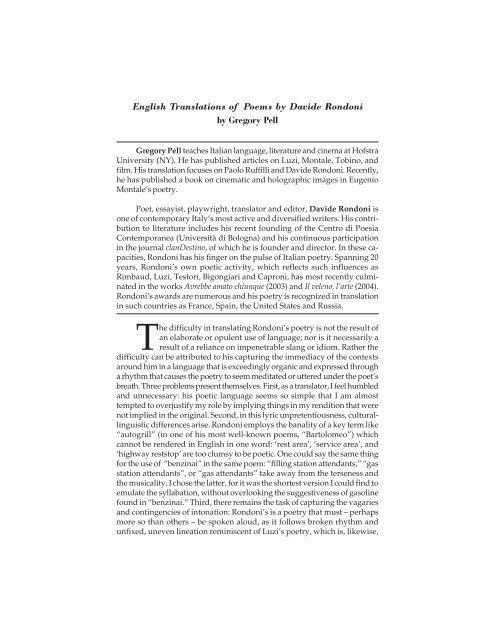Journal of Italian Translation
Journal of Italian Translation
Journal of Italian Translation
You also want an ePaper? Increase the reach of your titles
YUMPU automatically turns print PDFs into web optimized ePapers that Google loves.
English <strong>Translation</strong>s <strong>of</strong> Poems by Davide Rondoni<br />
by Gregory Pell<br />
Gregory Pell teaches <strong>Italian</strong> language, literature and cinema at H<strong>of</strong>stra<br />
University (NY). He has published articles on Luzi, Montale, Tobino, and<br />
film. His translation focuses on Paolo Ruffilli and Davide Rondoni. Recently,<br />
he has published a book on cinematic and holographic images in Eugenio<br />
Montale’s poetry.<br />
Poet, essayist, playwright, translator and editor, Davide Rondoni is<br />
one <strong>of</strong> contemporary Italy’s most active and diversified writers. His contribution<br />
to literature includes his recent founding <strong>of</strong> the Centro di Poesia<br />
Contemporanea (Università di Bologna) and his continuous participation<br />
in the journal clanDestino, <strong>of</strong> which he is founder and director. In these capacities,<br />
Rondoni has his finger on the pulse <strong>of</strong> <strong>Italian</strong> poetry. Spanning 20<br />
years, Rondoni’s own poetic activity, which reflects such influences as<br />
Rimbaud, Luzi, Testori, Bigongiari and Caproni, has most recently culminated<br />
in the works Avrebbe amato chiunque (2003) and Il veleno, l’arte (2004).<br />
Rondoni’s awards are numerous and his poetry is recognized in translation<br />
in such countries as France, Spain, the United States and Russia.<br />
The difficulty in translating Rondoni’s poetry is not the result <strong>of</strong><br />
an elaborate or opulent use <strong>of</strong> language; nor is it necessarily a<br />
result <strong>of</strong> a reliance on impenetrable slang or idiom. Rather the<br />
difficulty can be attributed to his capturing the immediacy <strong>of</strong> the contexts<br />
around him in a language that is exceedingly organic and expressed through<br />
a rhythm that causes the poetry to seem meditated or uttered under the poet’s<br />
breath. Three problems present themselves. First, as a translator, I feel humbled<br />
and unnecessary: his poetic language seems so simple that I am almost<br />
tempted to overjustify my role by implying things in my rendition that were<br />
not implied in the original. Second, in this lyric unpretentiousness, culturallinguistic<br />
differences arise. Rondoni employs the banality <strong>of</strong> a key term like<br />
“autogrill” (in one <strong>of</strong> his most well-known poems, “Bartolomeo”) which<br />
cannot be rendered in English in one word: ‘rest area’, ‘service area’, and<br />
‘highway reststop’ are too clumsy to be poetic. One could say the same thing<br />
for the use <strong>of</strong> “benzinai” in the same poem: “filling station attendants,” “gas<br />
station attendants”, or “gas attendants” take away from the terseness and<br />
the musicality. I chose the latter, for it was the shortest version I could find to<br />
emulate the syllabation, without overlooking the suggestiveness <strong>of</strong> gasoline<br />
found in “benzinai.” Third, there remains the task <strong>of</strong> capturing the vagaries<br />
and contingencies <strong>of</strong> intonation: Rondoni’s is a poetry that must – perhaps<br />
more so than others – be spoken aloud, as it follows broken rhythm and<br />
unfixed, uneven lineation reminiscent <strong>of</strong> Luzi’s poetry, which is, likewise,
















